中考英语专题复习——一般现在时课件33张
文档属性
| 名称 | 中考英语专题复习——一般现在时课件33张 | 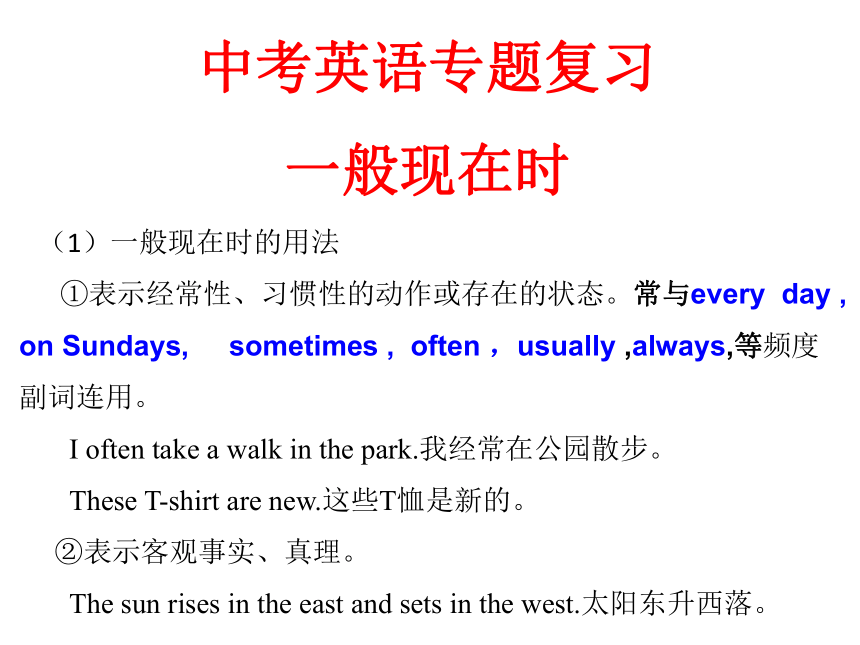 | |
| 格式 | ppt | ||
| 文件大小 | 670.0KB | ||
| 资源类型 | 教案 | ||
| 版本资源 | 通用版 | ||
| 科目 | 英语 | ||
| 更新时间 | 2022-01-02 08:52:14 | ||
图片预览

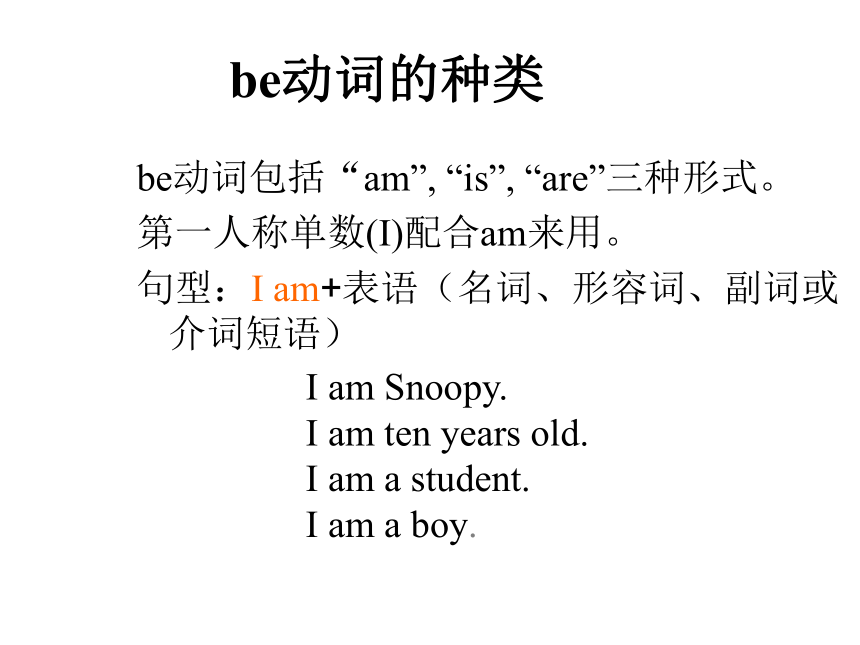
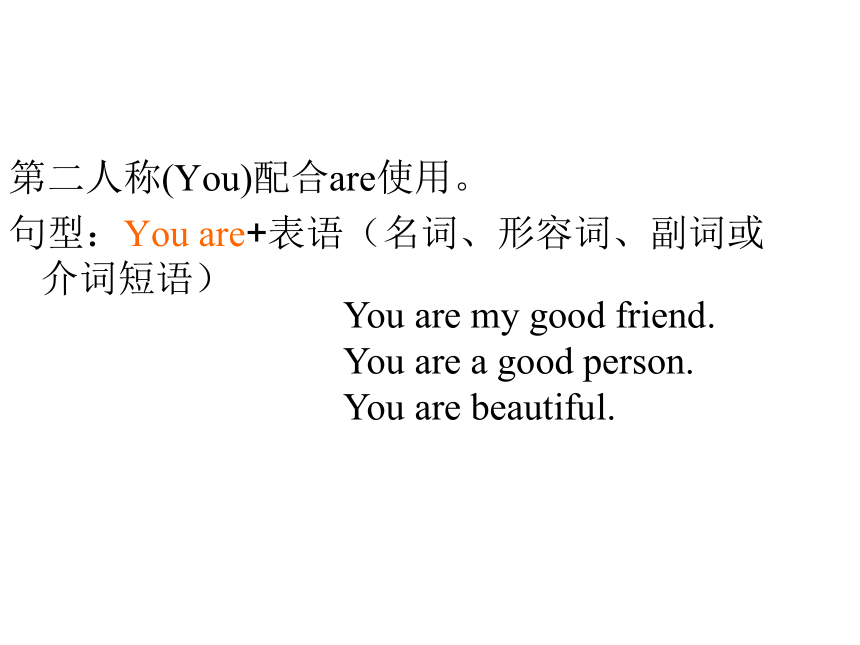
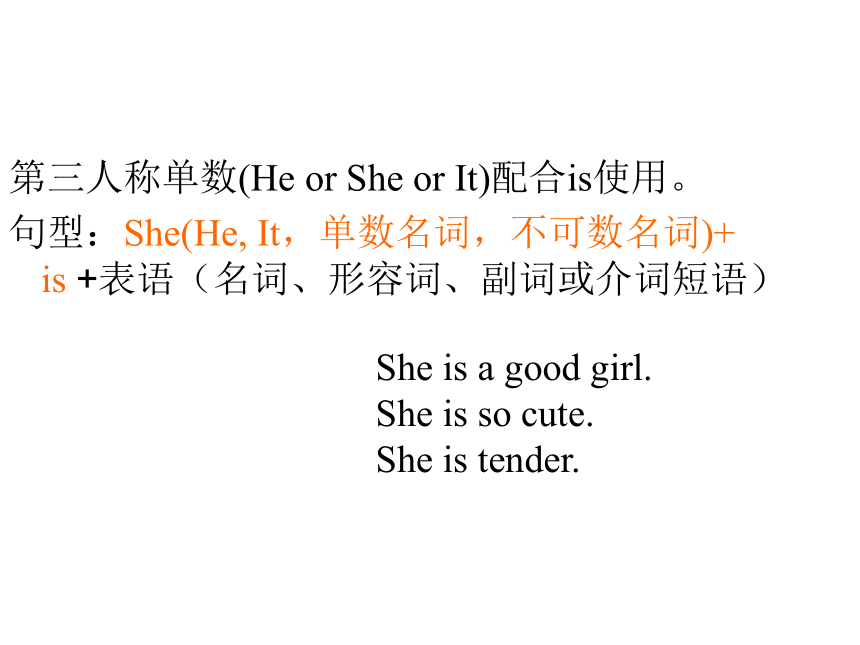
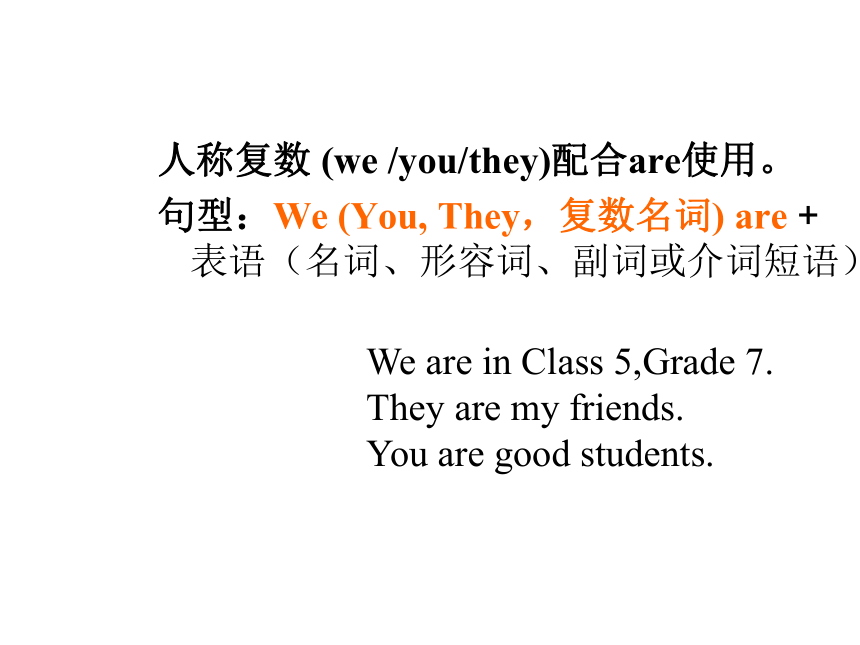
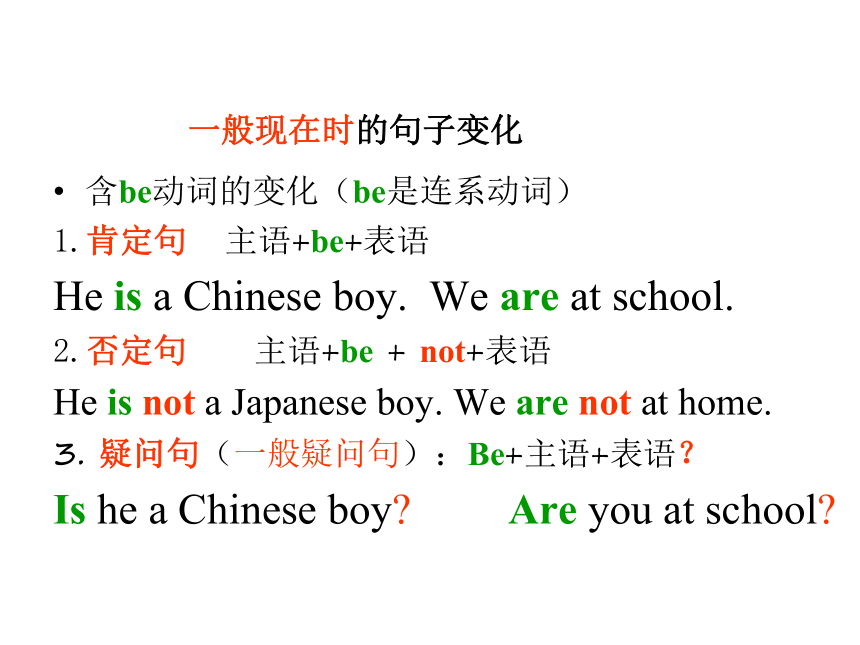
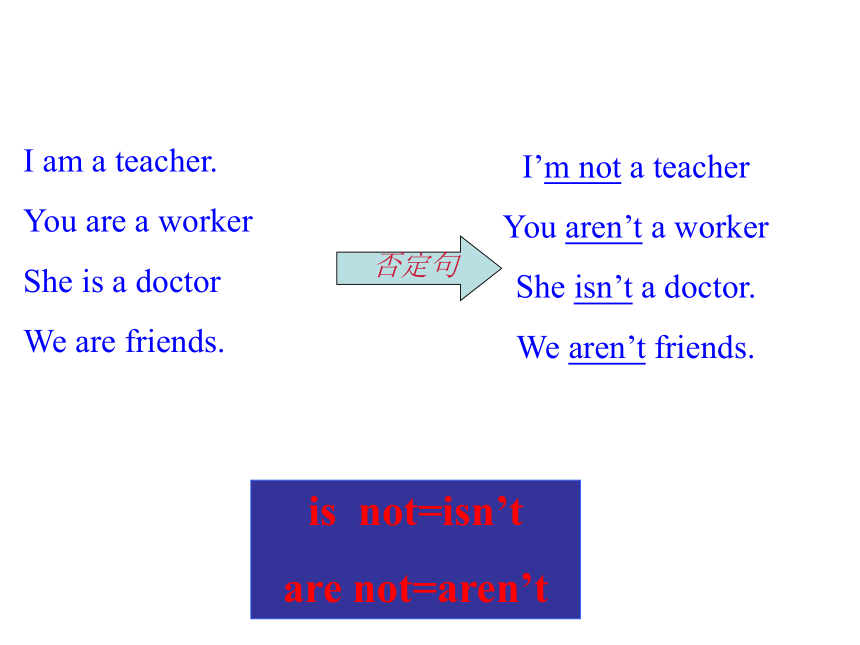

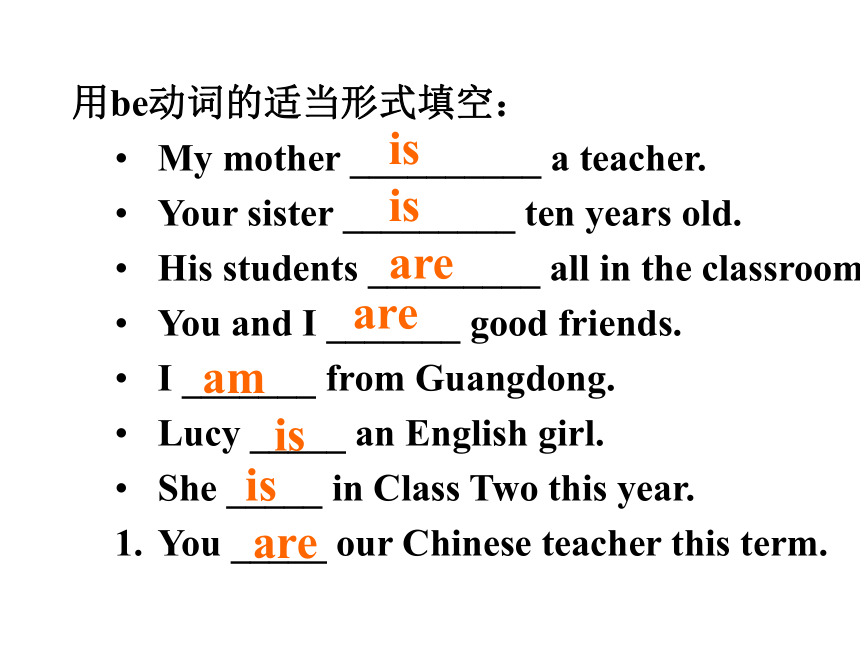
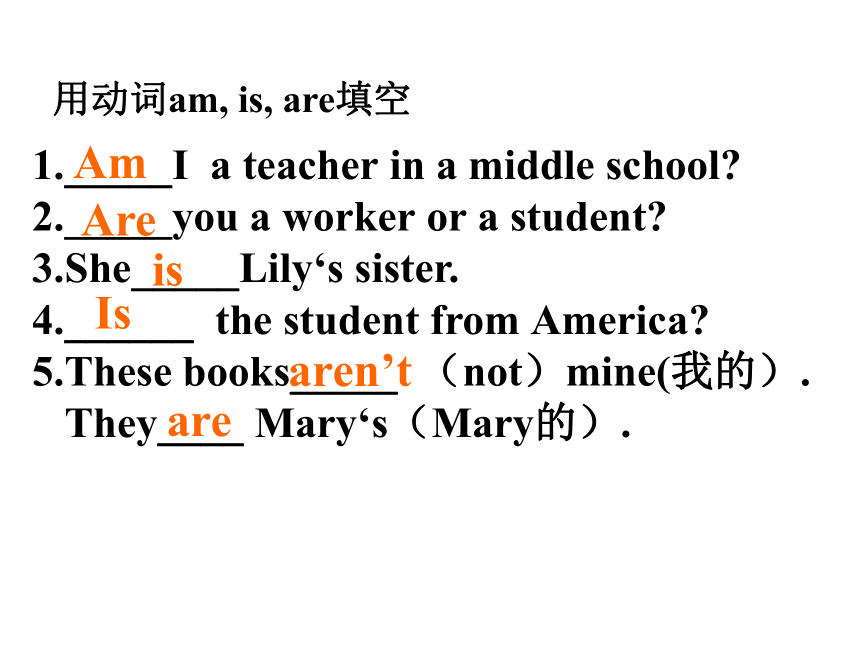
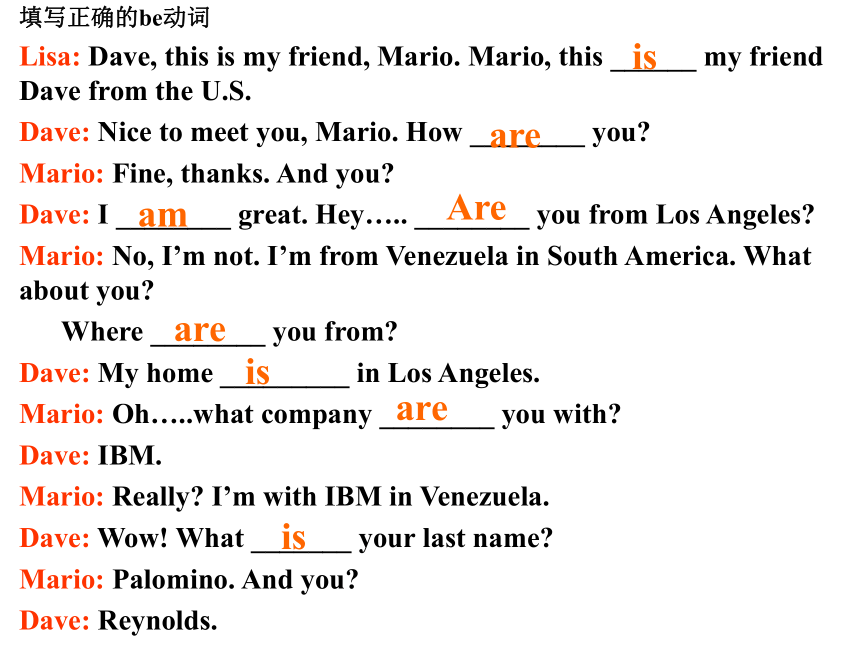
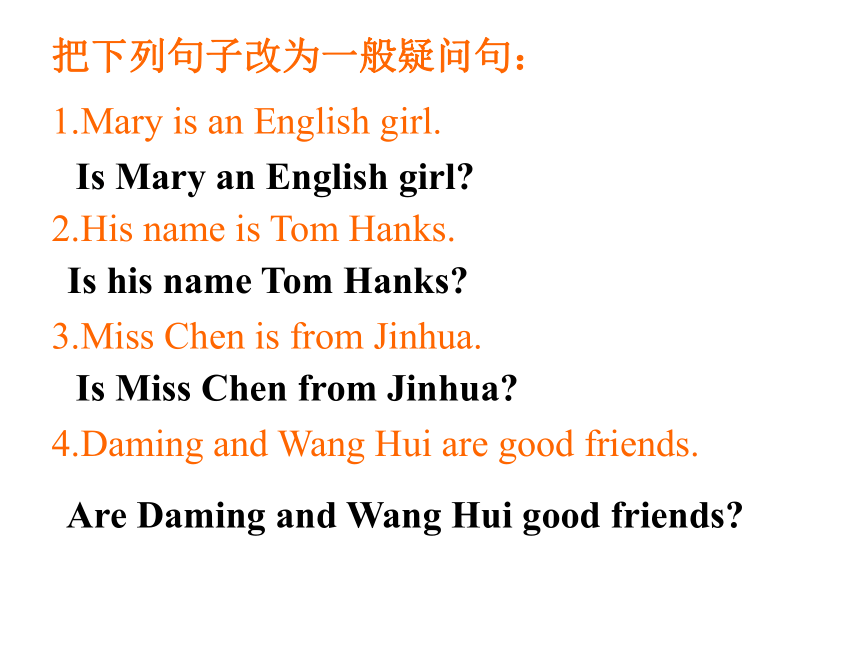
文档简介
(共33张PPT)
中考英语专题复习
一般现在时
(1)一般现在时的用法
①表示经常性、习惯性的动作或存在的状态。常与every day , on Sundays, sometimes , often ,usually ,always,等频度副词连用。
I often take a walk in the park.我经常在公园散步。
These T-shirt are new.这些T恤是新的。
②表示客观事实、真理。
The sun rises in the east and sets in the west.太阳东升西落。
be动词的种类
be动词包括“am”, “is”, “are”三种形式。
第一人称单数(I)配合am来用。
句型:I am+表语(名词、形容词、副词或介词短语)
I am Snoopy.
I am ten years old.
I am a student.
I am a boy.
第二人称(You)配合are使用。
句型:You are+表语(名词、形容词、副词或介词短语)
You are my good friend.
You are a good person.
You are beautiful.
第三人称单数(He or She or It)配合is使用。
句型:She(He, It,单数名词,不可数名词)+ is +表语(名词、形容词、副词或介词短语)
She is a good girl.
She is so cute.
She is tender.
人称复数 (we /you/they)配合are使用。
句型:We (You, They,复数名词) are +表语(名词、形容词、副词或介词短语)
We are in Class 5,Grade 7.
They are my friends.
You are good students.
含be动词的变化(be是连系动词)
1.肯定句 主语+be+表语
He is a Chinese boy. We are at school.
2.否定句 主语+be + not+表语
He is not a Japanese boy. We are not at home.
3. 疑问句(一般疑问句):Be+主语+表语?
Is he a Chinese boy Are you at school
一般现在时的句子变化
I am a teacher.
You are a worker
She is a doctor
We are friends.
I’m not a teacher
You aren’t a worker
She isn’t a doctor.
We aren’t friends.
is not=isn’t
are not=aren’t
否定句
疑问句
I am a teacher.
Are you a teacher
You are a worker.
Are you a worker
He is a student.
Is he a student
We are friends.
Are you friends
用be动词的适当形式填空:
My mother __________ a teacher.
Your sister _________ ten years old.
His students _________ all in the classroom.
You and I _______ good friends.
I _______ from Guangdong.
Lucy _____ an English girl.
She _____ in Class Two this year.
You _____ our Chinese teacher this term.
is
is
are
are
am
is
is
are
1._____I a teacher in a middle school 2._____you a worker or a student 3.She_____Lily‘s sister. 4.______ the student from America 5.These books_____ (not)mine(我的).
They____ Mary‘s(Mary的).
用动词am, is, are填空
Am
Are
is
Is
aren’t
are
填写正确的be动词
Lisa: Dave, this is my friend, Mario. Mario, this ______ my friend Dave from the U.S.
Dave: Nice to meet you, Mario. How ________ you
Mario: Fine, thanks. And you
Dave: I ________ great. Hey….. ________ you from Los Angeles
Mario: No, I’m not. I’m from Venezuela in South America. What about you
Where ________ you from
Dave: My home _________ in Los Angeles.
Mario: Oh…..what company ________ you with
Dave: IBM.
Mario: Really I’m with IBM in Venezuela.
Dave: Wow! What _______ your last name
Mario: Palomino. And you
Dave: Reynolds.
is
are
am
Are
are
is
are
is
把下列句子改为一般疑问句:
1.Mary is an English girl.
2.His name is Tom Hanks.
3.Miss Chen is from Jinhua.
4.Daming and Wang Hui are good friends.
Is Mary an English girl
Is his name Tom Hanks
Is Miss Chen from Jinhua
Are Daming and Wang Hui good friends
把下列句子改为一般疑问句:
1.I am twenty-nine.
2.I am in Class Five,Grade Seven.
3.We are from Beijing.
4.Her father and her mother are teacher.
Are you twenty-nine
Are you in Class……?
Are you from Beijing
Are her father and her mother teacher
把下列句子改为否定句:
1.I am twenty-nine.
2.I am in Class Five,Grade Seven.
3.We are from Beijing.
4.Her father and her mother are teachers.
I am not twenty-nine.
I am not in Class Five, Grade Seven.
We are not from Beijing.
Her father and mother are not teachers.
把下列句子改为否定句:
1.Mary is an English girl.
2.His name is Tom Hanks.
3.Miss Chen is from Yongkang.
4.Daming and Wang Hui are friends.
Mary isn’t an English girl.
His name isn’t T.om Hanks.
Miss Chen isn’t from Yongkang.
Daming and Wang Hui aren’t friends.
把下列句子改为否定句:
1.His favourite sport is swimming.
2. Eggs are my favourite food.
3.The girls are in the classroom.
4.It is warm today.
His favourite sport isn’t swimming.
Eggs aren’t my favourite food.
The girls aren’t in the classroom.
It isn’t warm today.
1.肯定句
1) 主语+动词原形(+其它)
We often play ping-pong after school.
They usually clean their classroom after class.
2)(第三人称单数)主语+ 动词的第三人称形式
She always does her homework at school.
Lucy runs fastest in her class.
He has lunch with his classmates at school.
行为动词一般现在时的句子变化
(2)一般现在时的构成
在一般情况下用动词原形,若主语为第三人称单数,一般在动词原形后加-s或-es。
情况 构成方法 例词
一般情况 直接加-s read→reads love→loves
以s,o,x,ch,sh结尾 加-es pass→passes box→boxes
teach→teaches wash→washes
以辅音字母+y结尾 将y变为i,再加-es carry→carries study→studies
不规则变化 have→has
help
guess
fly
make
leave
fix
swim
know
play
close
go
study
get
read
bring
watch
写出下列动词的第三人称单数形式
carry do wash
visit exercise enjoy jump have
s
ies
es
s
es
s
s
s
es
s
ies
s
s
s
has
es
s
s
es
s
s
es
ies
s
2.否定句
1)主语+do not (don’t) + 动词原形+其它
We don’t often play ping-pong after school.
They don’t usually clean their classroom after class.
2)(第三人称单数)主语+does not(doesn’t) +动词原形+其它
She doesn’t always do her homework at school.
Lucy doesn’t run fastest in her class.
He doesn’t have lunch with his classmates at school.
注意:当主语是单数第三人称时,否定句用了助动词does,动词谓语一定要恢复为原形。
I like English.
She likes it very much.
We go to work by bike.
I don’t like English.
She doesn’t like it verymuch.
We don’t go to work by bike.
否定句
3. 一般疑问句
1)Do+主语+动词原形+其它?
肯定回答:Yes, 主语+do.
否定回答:No, 主语+don’t.
Do you often play table tennis after school
Yes, I do.
No, I don’t.
Do they usually clean their classroom after class
Yes, they do.
No, they don’t.
2)Does+(第三人称单数)主语+动词原形+其它?
肯定回答:Yes, 主语+does.
否定回答: No, 主语+doesn’t.
Does she always do her homework at school
Yes, she does.
No, she doesn’t.
Does Lucy run fastest in her class
Yes, she does.
No, she doesn’t.
Does he have lunch with his classmates at school
Yes, he does.
No, he doesn’t.
对于实意动词,疑问句要求是:当主语是他(he),她(she),它(it)时,句子前面加does,并把动词恢复原形;当主语是其他人称时,句前加do ,第一人称(I/we) 换第二人称(you)。
I often go there.
You like the music.
He goes to work by bus .
We /You/They like it.
Do you often go there
Do you like the music
Does he go to work by bus
Do you/they like it
疑问句
be动词特殊疑问句1:特殊疑问词+am/is/are+主语+其他?
— Where is your bike
— It is near our classroom.
be动词特殊疑问句2:疑问词作主语或主语的定语 + am/is/are +表语
— Who is your English teacher.
— Mr. Li is our English teacher.
— Which classroom is yours
— The one on the second floor is ours.
特殊疑问句
特殊疑问句1:特殊疑问词+do+(第一/第二人称)主语+动词原形+其他?
Where do you live
When do the students have lunch every day
特殊疑问句2:特殊疑问词+does+(第三人称)主语+动词原形+其他?
When does your son go to bed every evening
特殊疑问句3: 疑问词作主语或作第三人称单数主语的定语+动词三单形式
Who lives in this room
Which car runs faster, this one or that one
I often go there.
You like the music.
He goes to work by bus .
We /You/They like it.
His father works in this hospital.
These are apples.
The girl in red is our monitor.
The black bike is Tom’s.
The books on the desk are mine.
Where ________often go
What ________ like
How ________ go to work
Who _______ it
Whose _______in this hospital
What ___________
Who _______your monitor
Which __________Tom’s
Which __________yours
特殊疑问句
do you
do you
does he
likes
father works
are these
is
bike is
books are
1.He has a meeting on Sundays .
2.He goes to school at seven in the morning .
3.My father and mother go out for lunch on Sundays.
4.We do our homework after school.
把下列句子改为一般疑问句
Does he have a meeting on Sundays
Does he go to school at seven in the morning
Do your father and mother go out for lunch on
Sundays
Do you do your homework after school
Exercise
把下列句子改为否定句
1.My father has an egg for breakfast .
2.Li Lei does his homework after school.
3.We do our homework at home.
4.They have a meeting every morning .
My father doesn’t have an egg for breakfast .
Li Lei doesn’t do his homework after school.
We don’t do our homework at home .
They don’t have a meeting every morning .
1. We often _____ (play) in the playground.
2. He ____ (get) up at six o’clock.
3. ___ you ____ (brush) your teeth every morning
4. What ___ he usually___ (do) after school
5. Danny______ (study) English, Chinese, Maths, Science and Art at school.
6. Mike sometimes _____(go) to the park with his sister.
7. She _____ (watch) TV with his parents every evening.
8.____ Mike ____(read) English every day
用所给动词的正确形式及助动词填空
play
gets
Do brush
does do
studies
goes
watches
Does read
9. Jordan _______(play) basketball.
He ___________(not play) football.
10. I _______(go) swimming on Sunday.
But I___________ (not go) shopping.
11. My cousins _______(enjoy) computer games.
But they __________(not enjoy) ball games.
12. You _______(like) fish.
But he ___________(not like) fish.
plays
doesn’t play
go
don’t go
enjoy
don’t enjoy
like
doesn’t like
13.My father_______(listen) to the radio every day.
14.Mike_______ (study) in a middle school.
15.She______(take) Eddie for a walk after supper.
16.He_______(wash) clothes with his hands.
17.Simon ______ (pass) the ball to Daniel.
18.Miss Li_______ (teach) Chinese.
19.Look at the animal, it ____ four legs.
listens
takes
studies
washes
passes
teaches
has
8
改错:
1.I goes to school at six every day.
2.He don’t like playing football.
3. I am watch TV every day.
4. Daming watchs TV in the evening.
5. Does he usually has a party
6. Our English doesn’t likes music.
7. Tony goes always to school at eight o’clock.
8. Does your parents like watching TV
9. Lily haves lunch at school.
10. My sister doesn’t her homework every .
____
____
____
____
____
____
_______________
____
____
go
doesn’t
去掉am
watches
have
like
always goes
____
do
has
doesn’t do
注意:我们用一般现在时进行表达时,不能同时使用be动词和行为动词
中考英语专题复习
一般现在时
(1)一般现在时的用法
①表示经常性、习惯性的动作或存在的状态。常与every day , on Sundays, sometimes , often ,usually ,always,等频度副词连用。
I often take a walk in the park.我经常在公园散步。
These T-shirt are new.这些T恤是新的。
②表示客观事实、真理。
The sun rises in the east and sets in the west.太阳东升西落。
be动词的种类
be动词包括“am”, “is”, “are”三种形式。
第一人称单数(I)配合am来用。
句型:I am+表语(名词、形容词、副词或介词短语)
I am Snoopy.
I am ten years old.
I am a student.
I am a boy.
第二人称(You)配合are使用。
句型:You are+表语(名词、形容词、副词或介词短语)
You are my good friend.
You are a good person.
You are beautiful.
第三人称单数(He or She or It)配合is使用。
句型:She(He, It,单数名词,不可数名词)+ is +表语(名词、形容词、副词或介词短语)
She is a good girl.
She is so cute.
She is tender.
人称复数 (we /you/they)配合are使用。
句型:We (You, They,复数名词) are +表语(名词、形容词、副词或介词短语)
We are in Class 5,Grade 7.
They are my friends.
You are good students.
含be动词的变化(be是连系动词)
1.肯定句 主语+be+表语
He is a Chinese boy. We are at school.
2.否定句 主语+be + not+表语
He is not a Japanese boy. We are not at home.
3. 疑问句(一般疑问句):Be+主语+表语?
Is he a Chinese boy Are you at school
一般现在时的句子变化
I am a teacher.
You are a worker
She is a doctor
We are friends.
I’m not a teacher
You aren’t a worker
She isn’t a doctor.
We aren’t friends.
is not=isn’t
are not=aren’t
否定句
疑问句
I am a teacher.
Are you a teacher
You are a worker.
Are you a worker
He is a student.
Is he a student
We are friends.
Are you friends
用be动词的适当形式填空:
My mother __________ a teacher.
Your sister _________ ten years old.
His students _________ all in the classroom.
You and I _______ good friends.
I _______ from Guangdong.
Lucy _____ an English girl.
She _____ in Class Two this year.
You _____ our Chinese teacher this term.
is
is
are
are
am
is
is
are
1._____I a teacher in a middle school 2._____you a worker or a student 3.She_____Lily‘s sister. 4.______ the student from America 5.These books_____ (not)mine(我的).
They____ Mary‘s(Mary的).
用动词am, is, are填空
Am
Are
is
Is
aren’t
are
填写正确的be动词
Lisa: Dave, this is my friend, Mario. Mario, this ______ my friend Dave from the U.S.
Dave: Nice to meet you, Mario. How ________ you
Mario: Fine, thanks. And you
Dave: I ________ great. Hey….. ________ you from Los Angeles
Mario: No, I’m not. I’m from Venezuela in South America. What about you
Where ________ you from
Dave: My home _________ in Los Angeles.
Mario: Oh…..what company ________ you with
Dave: IBM.
Mario: Really I’m with IBM in Venezuela.
Dave: Wow! What _______ your last name
Mario: Palomino. And you
Dave: Reynolds.
is
are
am
Are
are
is
are
is
把下列句子改为一般疑问句:
1.Mary is an English girl.
2.His name is Tom Hanks.
3.Miss Chen is from Jinhua.
4.Daming and Wang Hui are good friends.
Is Mary an English girl
Is his name Tom Hanks
Is Miss Chen from Jinhua
Are Daming and Wang Hui good friends
把下列句子改为一般疑问句:
1.I am twenty-nine.
2.I am in Class Five,Grade Seven.
3.We are from Beijing.
4.Her father and her mother are teacher.
Are you twenty-nine
Are you in Class……?
Are you from Beijing
Are her father and her mother teacher
把下列句子改为否定句:
1.I am twenty-nine.
2.I am in Class Five,Grade Seven.
3.We are from Beijing.
4.Her father and her mother are teachers.
I am not twenty-nine.
I am not in Class Five, Grade Seven.
We are not from Beijing.
Her father and mother are not teachers.
把下列句子改为否定句:
1.Mary is an English girl.
2.His name is Tom Hanks.
3.Miss Chen is from Yongkang.
4.Daming and Wang Hui are friends.
Mary isn’t an English girl.
His name isn’t T.om Hanks.
Miss Chen isn’t from Yongkang.
Daming and Wang Hui aren’t friends.
把下列句子改为否定句:
1.His favourite sport is swimming.
2. Eggs are my favourite food.
3.The girls are in the classroom.
4.It is warm today.
His favourite sport isn’t swimming.
Eggs aren’t my favourite food.
The girls aren’t in the classroom.
It isn’t warm today.
1.肯定句
1) 主语+动词原形(+其它)
We often play ping-pong after school.
They usually clean their classroom after class.
2)(第三人称单数)主语+ 动词的第三人称形式
She always does her homework at school.
Lucy runs fastest in her class.
He has lunch with his classmates at school.
行为动词一般现在时的句子变化
(2)一般现在时的构成
在一般情况下用动词原形,若主语为第三人称单数,一般在动词原形后加-s或-es。
情况 构成方法 例词
一般情况 直接加-s read→reads love→loves
以s,o,x,ch,sh结尾 加-es pass→passes box→boxes
teach→teaches wash→washes
以辅音字母+y结尾 将y变为i,再加-es carry→carries study→studies
不规则变化 have→has
help
guess
fly
make
leave
fix
swim
know
play
close
go
study
get
read
bring
watch
写出下列动词的第三人称单数形式
carry do wash
visit exercise enjoy jump have
s
ies
es
s
es
s
s
s
es
s
ies
s
s
s
has
es
s
s
es
s
s
es
ies
s
2.否定句
1)主语+do not (don’t) + 动词原形+其它
We don’t often play ping-pong after school.
They don’t usually clean their classroom after class.
2)(第三人称单数)主语+does not(doesn’t) +动词原形+其它
She doesn’t always do her homework at school.
Lucy doesn’t run fastest in her class.
He doesn’t have lunch with his classmates at school.
注意:当主语是单数第三人称时,否定句用了助动词does,动词谓语一定要恢复为原形。
I like English.
She likes it very much.
We go to work by bike.
I don’t like English.
She doesn’t like it verymuch.
We don’t go to work by bike.
否定句
3. 一般疑问句
1)Do+主语+动词原形+其它?
肯定回答:Yes, 主语+do.
否定回答:No, 主语+don’t.
Do you often play table tennis after school
Yes, I do.
No, I don’t.
Do they usually clean their classroom after class
Yes, they do.
No, they don’t.
2)Does+(第三人称单数)主语+动词原形+其它?
肯定回答:Yes, 主语+does.
否定回答: No, 主语+doesn’t.
Does she always do her homework at school
Yes, she does.
No, she doesn’t.
Does Lucy run fastest in her class
Yes, she does.
No, she doesn’t.
Does he have lunch with his classmates at school
Yes, he does.
No, he doesn’t.
对于实意动词,疑问句要求是:当主语是他(he),她(she),它(it)时,句子前面加does,并把动词恢复原形;当主语是其他人称时,句前加do ,第一人称(I/we) 换第二人称(you)。
I often go there.
You like the music.
He goes to work by bus .
We /You/They like it.
Do you often go there
Do you like the music
Does he go to work by bus
Do you/they like it
疑问句
be动词特殊疑问句1:特殊疑问词+am/is/are+主语+其他?
— Where is your bike
— It is near our classroom.
be动词特殊疑问句2:疑问词作主语或主语的定语 + am/is/are +表语
— Who is your English teacher.
— Mr. Li is our English teacher.
— Which classroom is yours
— The one on the second floor is ours.
特殊疑问句
特殊疑问句1:特殊疑问词+do+(第一/第二人称)主语+动词原形+其他?
Where do you live
When do the students have lunch every day
特殊疑问句2:特殊疑问词+does+(第三人称)主语+动词原形+其他?
When does your son go to bed every evening
特殊疑问句3: 疑问词作主语或作第三人称单数主语的定语+动词三单形式
Who lives in this room
Which car runs faster, this one or that one
I often go there.
You like the music.
He goes to work by bus .
We /You/They like it.
His father works in this hospital.
These are apples.
The girl in red is our monitor.
The black bike is Tom’s.
The books on the desk are mine.
Where ________often go
What ________ like
How ________ go to work
Who _______ it
Whose _______in this hospital
What ___________
Who _______your monitor
Which __________Tom’s
Which __________yours
特殊疑问句
do you
do you
does he
likes
father works
are these
is
bike is
books are
1.He has a meeting on Sundays .
2.He goes to school at seven in the morning .
3.My father and mother go out for lunch on Sundays.
4.We do our homework after school.
把下列句子改为一般疑问句
Does he have a meeting on Sundays
Does he go to school at seven in the morning
Do your father and mother go out for lunch on
Sundays
Do you do your homework after school
Exercise
把下列句子改为否定句
1.My father has an egg for breakfast .
2.Li Lei does his homework after school.
3.We do our homework at home.
4.They have a meeting every morning .
My father doesn’t have an egg for breakfast .
Li Lei doesn’t do his homework after school.
We don’t do our homework at home .
They don’t have a meeting every morning .
1. We often _____ (play) in the playground.
2. He ____ (get) up at six o’clock.
3. ___ you ____ (brush) your teeth every morning
4. What ___ he usually___ (do) after school
5. Danny______ (study) English, Chinese, Maths, Science and Art at school.
6. Mike sometimes _____(go) to the park with his sister.
7. She _____ (watch) TV with his parents every evening.
8.____ Mike ____(read) English every day
用所给动词的正确形式及助动词填空
play
gets
Do brush
does do
studies
goes
watches
Does read
9. Jordan _______(play) basketball.
He ___________(not play) football.
10. I _______(go) swimming on Sunday.
But I___________ (not go) shopping.
11. My cousins _______(enjoy) computer games.
But they __________(not enjoy) ball games.
12. You _______(like) fish.
But he ___________(not like) fish.
plays
doesn’t play
go
don’t go
enjoy
don’t enjoy
like
doesn’t like
13.My father_______(listen) to the radio every day.
14.Mike_______ (study) in a middle school.
15.She______(take) Eddie for a walk after supper.
16.He_______(wash) clothes with his hands.
17.Simon ______ (pass) the ball to Daniel.
18.Miss Li_______ (teach) Chinese.
19.Look at the animal, it ____ four legs.
listens
takes
studies
washes
passes
teaches
has
8
改错:
1.I goes to school at six every day.
2.He don’t like playing football.
3. I am watch TV every day.
4. Daming watchs TV in the evening.
5. Does he usually has a party
6. Our English doesn’t likes music.
7. Tony goes always to school at eight o’clock.
8. Does your parents like watching TV
9. Lily haves lunch at school.
10. My sister doesn’t her homework every .
____
____
____
____
____
____
_______________
____
____
go
doesn’t
去掉am
watches
have
like
always goes
____
do
has
doesn’t do
注意:我们用一般现在时进行表达时,不能同时使用be动词和行为动词
同课章节目录
- 词法
- 名词
- 动词和动词短语
- 动词语态
- 动词时态
- 助动词和情态动词
- 非谓语动词
- 冠词
- 代词
- 数词和量词
- 形容词副词及其比较等级
- 介词和介词短语
- 连词和感叹词
- 构词法
- 相似、相近词比较
- 句法
- 陈述句
- 一般疑问句和否定疑问句
- 特殊疑问句及选择疑问句
- 反意疑问句
- 存在句(There be句型)
- 宾语从句
- 定语从句
- 状语从句
- 主谓一致问题
- 简单句
- 并列句
- 复合句
- 主谓一致
- 主、表语从句
- 名词性从句
- 直接引语和间接引语
- 虚拟语气
- 感叹句
- 强调句
- 倒装句
- 祈使句
- 句子的成分
- 句子的分类
- 题型专区
- 单项选择部分
- 易错题
- 完形填空
- 阅读理解
- 词汇练习
- 听说训练
- 句型转换
- 补全对话
- 短文改错
- 翻译
- 书面表达
- 任务型阅读
- 语法填空
- 其他资料
